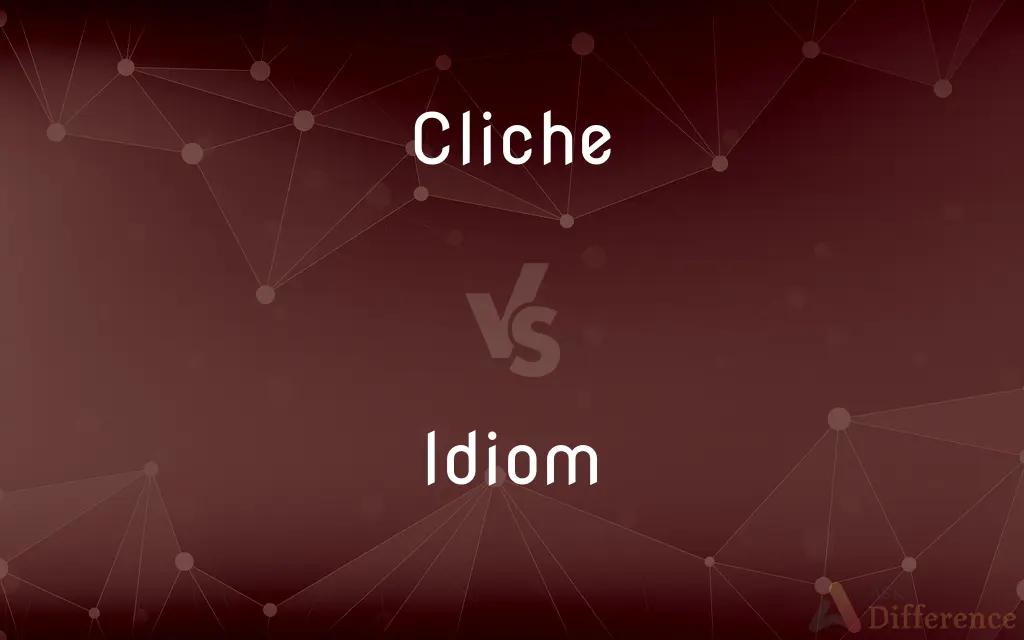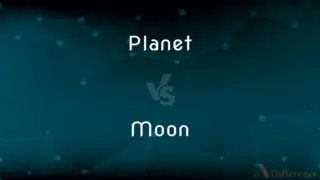Cliche vs. Idiom — What's the Difference?

Difference Between Cliche and Idiom
ADVERTISEMENT
Compare with Definitions
Cliche
A trite or overused expression or idea
"Even while the phrase was degenerating to cliché in ordinary public use ... scholars were giving it increasing attention" (Anthony Brandt).
Idiom
An idiom is a phrase or expression that typically presents a figurative, non-literal meaning attached to the phrase; but some phrases become figurative idioms while retaining the literal meaning of the phrase. Categorized as formulaic language, an idiom's figurative meaning is different from the literal meaning.
Cliche
A person or character whose behavior is predictable or superficial
"There is a young explorer ... who turns out not to be quite the cliche expected" (John Crowley).
Idiom
A group of words established by usage as having a meaning not deducible from those of the individual words (e.g. over the moon, see the light).
Cliche
Usage Problem Clichéd.
ADVERTISEMENT
Idiom
A characteristic mode of expression in music or art
They were both working in a neo-impressionist idiom
Cliche
Alternative form of cliché
Idiom
A speech form or an expression of a given language that is peculiar to itself grammatically or cannot be understood from the individual meanings of its elements, as in keep tabs on.
Cliche
Alternative form of cliché
Idiom
The specific grammatical, syntactic, and structural character of a given language.
Cliche
A stereotype plate or any similar reproduction of ornament, or lettering, in relief.
Idiom
Regional speech or dialect.
Cliche
A trite or obvious remark.
Idiom
A specialized vocabulary used by a group of people; jargon
Legal idiom.
Cliche
A trite or obvious remark
Idiom
A style of artistic expression characteristic of a particular individual, school, period, or medium
The idiom of the French impressionists.
The punk rock idiom.
Idiom
A manner of speaking, a mode of expression peculiar to a language, language family, or group of people.
In English, idiom requires the indefinite article in a phrase such as "she's an engineer", whereas in Spanish, idiom forbids it.
Some of the usage prescriptions improved clarity and were kept; others that yielded discordant violations of idiom were eventually revised.
Idiom
(programming) A programming construct or phraseology that is characteristic of the language.
Idiom
A language or language variety; specifically, a restricted dialect used in a given historical period, context etc.
In the idiom of the day, they were sutlers, although today they'd probably be called vendors.
Idiom
An established phrasal expression whose meaning may not be deducible from the literal meanings of its component words.
She often spoke in idioms, pining for salad days and complaining about pots calling the kettle black.
Idiom
An artistic style (for example, in art, architecture, or music); an instance of such a style.
The idiom of the expressionists
Idiom
The syntactical or structural form peculiar to any language; the genius or cast of a language.
Idiom may be employed loosely and figuratively as a synonym of language or dialect, but in its proper sense it signifies the totality of the general rules of construction which characterize the syntax of a particular language and distinguish it from other tongues.
By idiom is meant the use of words which is peculiar to a particular language.
He followed their language [the Latin], but did not comply with the idiom of ours.
Idiom
An expression conforming or appropriate to the peculiar structural form of a language.
Some that with care true eloquence shall teach,And to just idioms fix our doubtful speech.
Idiom
A combination of words having a meaning peculiar to itself and not predictable as a combination of the meanings of the individual words, but sanctioned by usage; as, an idiomatic expression; less commonly, a single word used in a peculiar sense.
It is not by means of rules that such idioms as the following are made current: "I can make nothing of it." "He treats his subject home." Dryden. "It is that within us that makes for righteousness." M. Arnold.
Sometimes we identify the words with the object - though by courtesy of idiom rather than in strict propriety of language.
Idiom
The phrase forms peculiar to a particular author; as, written in his own idiom.
Every good writer has much idiom.
Idiom
Dialect; a variant form of a language.
Idiom
A manner of speaking that is natural to native speakers of a language
Idiom
The usage or vocabulary that is characteristic of a specific group of people;
The immigrants spoke an odd dialect of English
He has a strong German accent
Idiom
The style of a particular artist or school or movement;
An imaginative orchestral idiom
Idiom
An expression whose meanings cannot be inferred from the meanings of the words that make it up
Share Your Discovery

Previous Comparison
Planet vs. Moon
Next Comparison
Region vs. Zone














































